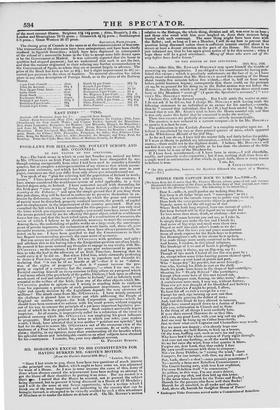POOR-LAWS FOR IRELAND—MR. POULETT SCROPE AND MR. O'CONNELL.
TO THE EDITOR OF THE SPECTATOR.
SIR—The harsh terms in which in your last Number you noticed my letter to Mr. O'CONNELL on Irish Poor-laws would have been disregarded by me, though coming unexpectedly from what I had been used to consider a friendly quarter, but so complete a misrepresentation of my views as that which accom- panies your strictures, and which has been repeated more than once in your paper, convinces me that you differ from only where you misunderstand me. You peak of my "plan for relieving half the population of Ireland in work-. houses. ' I have never advocated such a wild scheme. On the contrary, I have always considered the workhouse system of relief applicable, in a very limited degree only, to Ireland. I have contented myself with demanding for the Iriah poor "some means of living by honest industry either in their own country or the Colonies ;" and upon the simple ground that if you deny them this just claim they will be forced to endeavour to preserve themselves in ex- istence by dishonesty, crime, or mendicancy, by which the peace and comfort of society must be disturbed, property rendered insecure, the growth of capital and its employment in the improvement of the country prevented. Had you consulted the bill which I have introduced for this purpose—had you only read the letter which you stigmatize so strongly—you would have been aware that of the means pointed out by me for effecting this great object, relief in workhouses forms but one, and that the least relied upon, of a combination of resources, the union of which I believe to be absolutely necessary to meet the emergency. Among these, the undertaking of public works on a large scale, the encourage- ment of private improvers, the reclamation of waste lands, and, above all, your favourite resource, systematic colonization, have been always prominently in- sisted on by rue. I have been gratified to find the Commissioners in their late Report recommending precisely the same series of measures. But you accuse me of attacking Mr. O'CONNF.I.I. with petulance and spite; and attribute this to his having taken the Emigration question out of my hands. Be assured it has never entered my thoughts to engage in any rivalry with Mr. O'CoNstsar : on the contrary, I have for years past endeavoured to persuade him to take the lead in the advocacy of an Irish Poor-law, knowing that he !could carry it if he did so. But when I find him, while outwardly professing to desire a Poor-law, stepping out of his way to reprobate and discredit it; declaring that "it can be of no benefit at all "—that it is an "abdica- tion of the rights of property "— that it " cannot increase the pro- perty or capital of a country, but the contrary," — when I see one so in- fluential exerting himself on every occasion to fling odium on a proposal which I and many others (the great body of the public, I believe,) look upon as offering much more of real and substantial "justice to Ireland," and as infinitely more essential to the welfare of the Irish, than any of the other objects which Mr. O'CoNicera. prefers to agitate—am I wrong in standing forth to vindicate from his aspersions a principle of such paramount importance, upon whose right and speedy decision by the Legislature depends the very existence of millions? The attack came from Mr. O'CONNELL. I have merely answered the challenge it pleased him to throw out while addressing the People of England on another subject—the Irish Corporation question—which he should have been contented to enforce with his; usual power, without stepping out of his way to censure the principle of a yet more important legislative pro- posal of which he is the professed advocate. Such conduct necessarily begets suspicion. At all events, it imperatively called for a refutation of the error in political economy which Mr. O'CONNELL was employing his great influence to propagate. Had you printed the letter to which you refer, your readers would, I think, have admitted that it was neither " petulant nor spiteful," but had for its object to reason Mr. O'CONNELL out of the erroneous view of the tendency of a Poor law, which be seizes every occasion, fit or unfit, to pro- claim ; theiebv, in my opinion, more than counteracting all the benefits which his splendid talents and indefatigable exertions on other subjects have obtained for his countrymen. I remain, Sir, your very obedient servant, G. POULETT &CROP/. G. POULETT &CROP/.


























 Previous page
Previous page